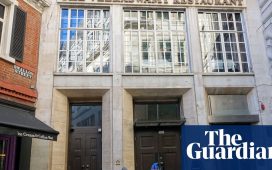Unlock the Editor’s Digest for free
Roula Khalaf, Editor of the FT, selects her favourite stories in this weekly newsletter.
When office rental company WeWork filed for bankruptcy last year, founder Adam Neumann described its collapse as “hard to watch from the sidelines”. He did not stay there for long. Neumann has plans to regain control of the company. The poor state of the commercial property market does not inspire much hope for a turnaround.
A quick recap: Neumann founded WeWork in 2010 and turned it into a global brand with a $47bn valuation. He was ousted in 2019 after a disastrous listing document that claimed the company would elevate the world’s consciousness while revealing annual losses of $1.9bn and future lease obligations of more than $47bn.
Since then, Neumann’s fortunes have eclipsed WeWork’s. He departed with an exit package worth about $1bn and created residential letting start-up Flow with backing from prestigious Silicon Valley VC firm Andreessen Horowitz. WeWork went public via a Spac, reported ballooning losses and then filed for Chapter 11 bankruptcy protection. Its equity is now near worthless and it is attempting to wipe out more than $4bn of debt and jettison or renegotiate nearly all of its leases.

Founders who leave under a cloud can go on to win investor and market backing. Mike Cagney left fintech SoFi following lawsuits alleging sexual harassment and unfair work practices at the lender. His subsequent venture, Figure, is now considering a market listing.
Still, Neumann is an unusual case. He has a poor relationship with WeWork investor SoftBank, the company’s biggest creditor. Sourcing investors for another shot at running the company will be difficult. The model for co-working has not yet been proved. Plus, remote working has curbed demand for office space.
The IMF has warned that in the US, the world’s largest commercial property market, prices are down 11 per cent since interest rates started to rise in March 2022. IWG, which also has a shared office brand called Spaces, has not reported positive net income for the past four years, although its shares have performed much better lately.

Cheaper refits and limited shared space might help WeWork to break even post bankruptcy. Lending the company’s brand name and sharing rental income with landlords instead of leasing space — a capital-light structure — is another possibility.
But WeWork made its name with eye-catching, city centre offices, rapid expansion and the lofty goal of changing the way that the world works. The prospect of a modest, slimmed down WeWork is unlikely to sit well with Neumann’s grand vision for himself or the company.
The Lex team produces timely commentary on capital trends and big businesses. We’d like to hear more from readers. Please tell us what you think in the comments section below or email lexfeedback@ft.com.












